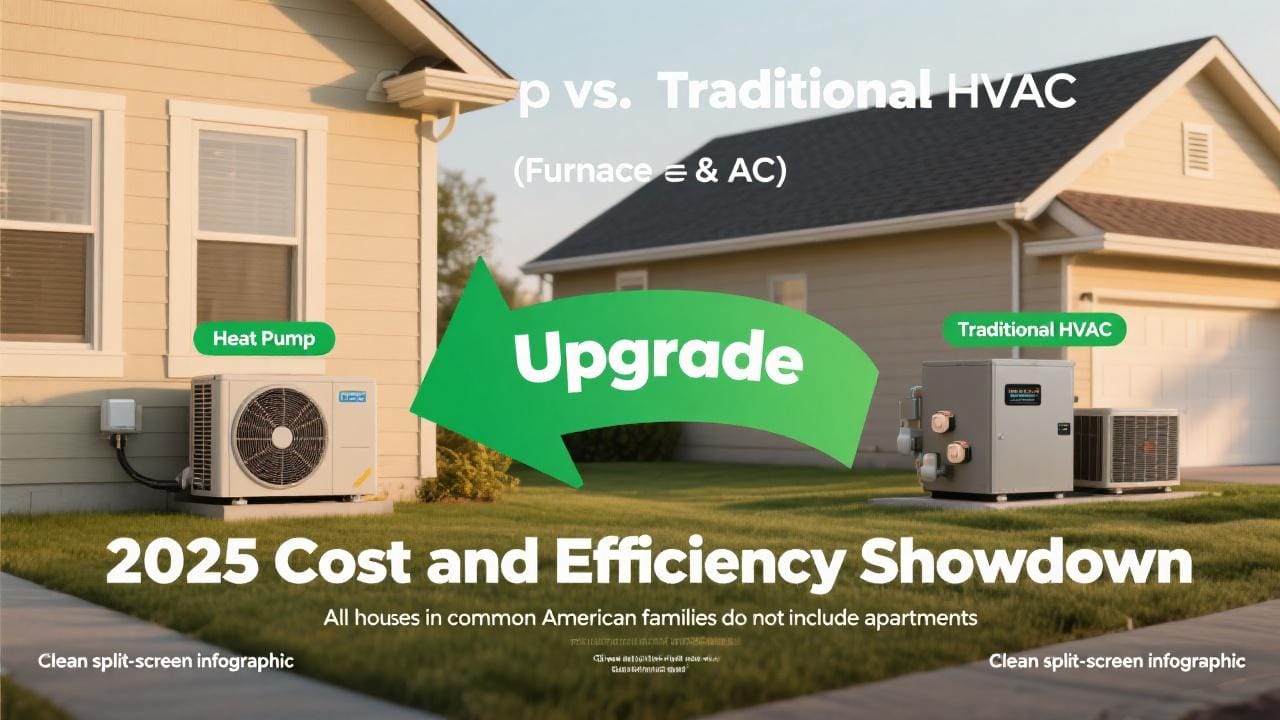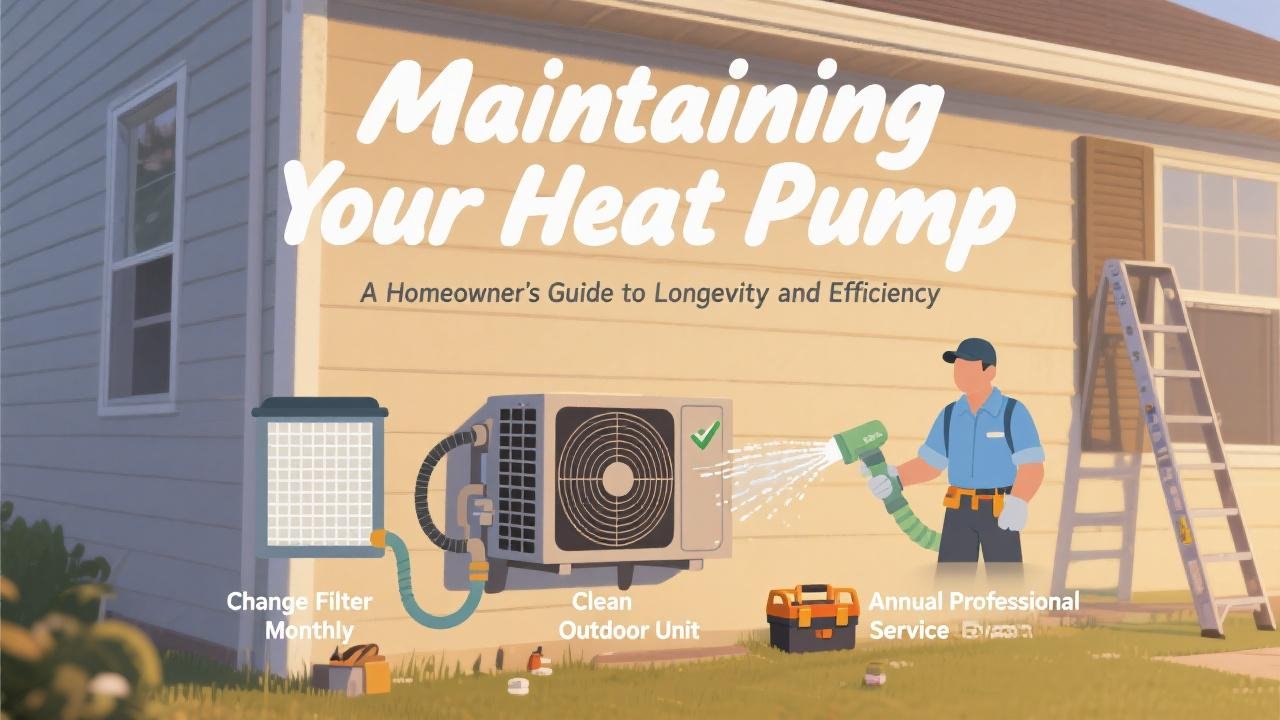The Evolving Landscape of Home Comfort
For generations, the combination of a furnace for heating and a central air conditioner for cooling has been the standard HVAC setup in many homes. However, as energy costs rise and environmental concerns grow, homeowners in 2025 are increasingly seeking more efficient and versatile solutions. Heat pumps have emerged as a powerful contender, offering both heating and cooling in a single unit with significantly better energy efficiency. But how do they truly stack up against traditional systems in terms of cost, efficiency, and overall performance? This guide provides a 2025 showdown between heat pumps and conventional furnace/AC combos.
How They Differ: The Core Technology
- Traditional Furnace & AC:
- Furnace (Heating): Burns a fuel source (commonly natural gas, propane, or oil) or uses electric resistance to generate heat, which is then distributed throughout the home via ductwork.
- Air Conditioner (Cooling): Uses a refrigerant cycle to absorb heat from inside your home and release it outside, cooling the indoor air.
- These are two separate systems, often sharing the same ductwork and blower fan in the air handler.
- Heat Pump:
- All-in-One System: A heat pump provides both heating and cooling using a reversible refrigeration cycle.
- Moving Heat: In winter, it extracts heat from an outside source (air for air-source heat pumps, ground for geothermal) and moves it inside. In summer, it extracts heat from inside your home and moves it outside, functioning like an air conditioner. It doesn’t generate heat by burning fuel.
Efficiency Comparison: The Clear Winner
This is where heat pumps truly shine, especially modern air-source heat pumps (ASHPs) and geothermal heat pumps (GSHPs) available in 2025.
- Heat Pump Efficiency:
- Heating: Instead of achieving efficiencies around 80-98% (AFUE – Annual Fuel Utilization Efficiency) like gas furnaces, heat pumps can be 200% to 400% efficient (or a COP of 2 to 4). This means for every unit of electricity they consume, they can deliver 2 to 4 units of heat energy by effectively moving existing heat.
- Cooling (SEER2): Heat pumps offer cooling efficiencies (SEER2 ratings) comparable to or often exceeding those of high-efficiency central air conditioners. Minimum SEER2 for new heat pumps in 2025 is 14.3, with many ENERGY STAR models reaching 16-20+ SEER2.
- Furnace Efficiency (AFUE):
- Standard new gas furnaces typically have an AFUE of 80% to 90%. High-efficiency condensing furnaces can reach 90% to 98.5% AFUE. This means 80-98.5% of the fuel burned is converted to usable heat, while the rest is lost.
- Central Air Conditioner Efficiency (SEER2):
- New central AC units in 2025 must meet a minimum SEER2 of 13.4 (in the South/Southwest) or 14.3 (in the North). High-efficiency models can reach SEER2 ratings of 20 or higher.
Verdict on Efficiency: Heat pumps, particularly geothermal systems, are significantly more energy-efficient for heating than even the highest-efficiency fossil fuel furnaces. For cooling, high-efficiency heat pumps are on par with top-tier central ACs.
Cost Comparison: Upfront vs. Long-Term
1. Upfront Installation Costs (2025 Estimates):
- Traditional Furnace & AC Combo:
- New Gas Furnace: $3,000 – $7,500+ (installed)
- New Central AC: $3,500 – $8,000+ (installed)
- Total Combo: $6,500 – $15,000+
- Air-Source Heat Pump (ASHP):
- $3,000 – $15,000 (installed, depending on brand, efficiency, and complexity like ductless mini-splits vs. central).
- Geothermal Heat Pump (GSHP):
- $15,000 – $35,000+ (installed, due to ground loop excavation).
Initial Cost Observation: A mid-efficiency ASHP might have a similar upfront cost to a new furnace and AC combo. High-efficiency ASHPs can be more expensive. Geothermal systems have the highest upfront cost.
2. Operating Costs & Long-Term Savings:
- Heat Pumps:
- Due to their higher efficiency, heat pumps generally have lower operating costs, especially for heating compared to furnaces (particularly oil or propane furnaces, and often electric resistance heat).
- Savings are most significant when replacing less efficient systems or expensive fuel sources like heating oil or propane. A CNET case study showed a homeowner saving $800 in the first year after switching from heating oil to a heat pump.
- The payback period for the higher upfront cost of a heat pump (especially geothermal) can be longer, but the lifetime savings can be substantial.
- Furnace & AC:
- Operating costs depend on local fuel prices (natural gas, propane, oil) and electricity rates. Natural gas is often cheaper than electricity per BTU in some regions, which can make high-efficiency gas furnaces competitive in operating cost for heating in those areas, though heat pumps can still win on overall energy use.
- Electricity costs for AC operation will be similar to a heat pump of equivalent SEER2 rating.
3. Incentives (A Game Changer for Heat Pumps in 2025):
- Heat Pumps:
- Federal Tax Credits:
- Air-Source Heat Pumps: Up to $2,000 (30% of cost) for ENERGY STAR Most Efficient models.
- Geothermal Heat Pumps: 30% of total cost (no cap) for ENERGY STAR models.
- State/Local Rebates: Many states and utilities offer significant rebates for heat pump installations, often hundreds or thousands of dollars.
- IRA Rebate Programs (HOMES & HEAR): Upcoming federal rebates administered by states can offer thousands more, especially for low-to-moderate-income households (e.g., up to $8,000 for a heat pump under HEAR).
- Federal Tax Credits:
- Furnace & AC:
- Federal Tax Credits: Up to $600 for high-efficiency gas furnaces and central ACs meeting specific ENERGY STAR criteria.
- State/local rebates may also be available but are often less substantial than those for heat pumps.
Impact of Incentives: The robust incentives available for heat pumps in 2025 can dramatically reduce their net upfront cost, often making them highly competitive with or even cheaper than installing a new traditional furnace and AC system, especially when long-term energy savings are factored in.
Performance and Comfort Considerations:
- Heating Performance in Cold Climates:
- Furnaces: Gas furnaces provide strong, consistent heat even in the coldest temperatures.
- Heat Pumps: Older ASHPs struggled in very cold weather. However, modern cold-climate heat pumps (CCHPs) available in 2025 are designed to operate efficiently down to -13°F (-25°C) or lower, often eliminating the need for backup heating systems in many regions. Geothermal heat pumps are unaffected by outdoor air temperature.
- Cooling Performance: Both heat pumps and central ACs provide effective cooling. Variable-speed heat pumps can offer superior dehumidification and more consistent temperatures compared to single-stage ACs.
- Lifespan:
- Furnaces: 15-25 years.
- Central ACs: 10-15 years.
- Air-Source Heat Pumps: 15-20 years.
- Geothermal Heat Pumps: Indoor unit 20-25 years, ground loop 50+ years.
- Environmental Impact:
- Heat pumps (especially when powered by renewable electricity) are far more environmentally friendly as they don’t burn fossil fuels on-site for heating and are more energy-efficient overall.
Which System is Right for You in 2025?
- Consider a Heat Pump if:
- You prioritize maximum energy efficiency and lower long-term operating costs.
- You want to reduce your home’s carbon footprint.
- You are eligible for significant federal, state, or local heat pump incentives.
- You need to replace both your heating and cooling systems.
- You live in a moderate climate, or are considering a cold-climate model for colder regions.
- For geothermal: You have adequate yard space and are willing to make a larger upfront investment for the highest efficiency and longest lifespan.
- A Traditional Furnace & AC Might Still Be Considered if:
- You live in an extremely cold climate where natural gas is very inexpensive, and you are not considering a specialized cold-climate heat pump (though CCHPs are increasingly viable).
- You only need to replace one component (e.g., just the furnace) and the other is relatively new and efficient.
- Upfront cost is the absolute primary driver, and incentives don’t bridge the gap sufficiently for a heat pump in your specific situation (though this is becoming less common).
The Efficient Future Favors Heat Pumps
While traditional furnaces and air conditioners have served homes for decades, the efficiency, versatility, and environmental benefits of heat pumps, especially with the robust incentives available in 2025, make them an increasingly superior choice for most homeowners. The ability to provide both heating and cooling from a single, highly efficient unit, coupled with significant tax credits and rebates, often positions heat pumps as the more economical and eco-friendly long-term solution.
Before making a decision, get multiple quotes from qualified HVAC professionals for both types of systems. Discuss your energy bills, comfort needs, and available incentives. Resources that help homeowners compare energy solutions, like EnergySage for solar, can be a model for finding trusted advice and competitive quotes for HVAC upgrades as well.



